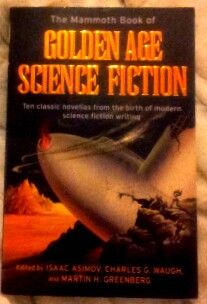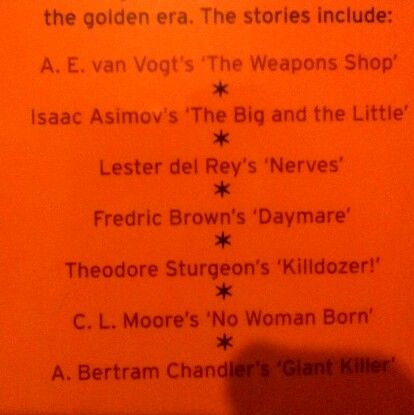Right now I'd like to start with Golden Age 40s-50s material (or golden age authors) and work my way forward down the chain of influences to get a better understanding of the genre.
"Golden Age" can mean different things to different people. It's usually used in a strict sense of
Astounding's Golden Age which runs, at most, from 1939-1949 but some people restrict it to 1947 or so (when Heinlein started publishing in the slicks) to even 1942 or so (when a lot of writers temporarily stopped writing due to the war effort). As such, it's exclusively a magazine phenomenon and, while there were many great serials, it was almost exclusively a short-fiction phenomenon. It sounds like you're using it in a "stuff that came before the New Wave" sense, which would be 1939-early 60s (or "40s-50s material") and that definitely features more "book" material but, even so, magazines were pretty dominant through even this period.
As is, I have a few '50s novels on hand--Starship Troopers, I Am Legend, among others--and I've got Library of America's two volume '50s sci-fi collection, two volumes of Asimov's short stories (complete short stories vols. 1 & 2) in the mail along with Clarke's The City and the Stars and The Songs of Distant Earth (I realize this is a later work) in the mail. I'm happy for whatever advice I can get.
Before reading
Starship Troopers, I would recommend reading
The Past Through Tomorrow, which collects virtually all Heinlein's early Future History stories, and some of his less controversial juveniles actually published by Scribners', and
Double Star. That "Complete Stories" of Asimov is anything but - one is an omnibus of three collections and another is a miscellany of stories and the two together are still woefully incomplete. That said, I think the omnibus volume includes
The Martian Way and
Earth is Room Enough and hopefully
Nine Tomorrows or something like, and isn't a bad thing to have. But Asimov's real early core was
The Foundation Trilogy, the Robot stories (initially collected in
I, Robot and later in
The Complete Robot (which was complete in 1982 but isn't any longer), and a couple of stand-alones like "Nightfall". Then, in the 50s, he added the two Robot novels (
The Caves of Steel,
The Naked Sun) and a semi-stand-alone (
The End of Eternity). Clarke is actually not entirely a Golden Age author, though he's one of "the Big Three" as canonized in the 50s. Clarke published a couple of stories in amateur publications and was first published in
Astounding in 1946 or so, whereas Heinlein, Asimov, and van Vogt (arguably the original "Big Three") were published, along with numerous others like Sturgeon and Leiber, in 1939.
The City and the Stars is a a revision of
Against the Fall of Night and might not be a bad start but I wouldn't recommend
The Songs of Distant Earth at all. It's not bad, but it's an 80s book and not particularly good, either. Maybe
Childhood's End would be the way to go there.
Beyond the Big Three, I'd recommend reading a lot of anthologies and following those authors who intrigue you. Things like Healy/McComas'
Adventures in Space and Time, Boucher's
A Treasury of Great Science Fiction, and so on. There's also an Asimov/Greenberg series of retro-anthologies covering 1939-1963. And one of the best series for the purpose that you can get into is a 70s series from Ballantine called
The Best of <Author>. This takes the broad-church definition of authors who published their first story 1950 or before, with some notable omissions. Some, like Heinlein and Asimov, can be explained like Elizabethan poetry anthologies "exclusive of Spenser and Shakespeare" where you're just assumed to have the works of those authors but others, like Simak, are a bit harder to figure. Still, the authors in that series are Stanley G. Weinbaum (30s), Fritz Leiber, Frederik Pohl, Henry Kuttner, Cordwainer Smith, C.L. Moore, John W. Campbell (30s), C.M. Kornbluth, P.K. Dick, Frederic Brown, Edmond Hamilton, Leigh Brackett, Robert Bloch, Murray Leinster, L. Sprague de Camp, Jack Williamson, Raymond Z. Gallun, Lester del Rey, Eric Frank Russell, Hal Clement, and James Blish.
To that, I'd add at least Bradbury (not a huge fan, but can't do without
The Martian Chronicles,
Fahrenheit 451, and a selection of stories), Doc Smith (if you want to understand modern SF, that includes the New Space Opera, and so you need to know the old Space Opera - the Skylark series but, especially, the Lensman series), and Theodore Sturgeon (someone like Asimov and Heinlein, where you need something like the complete works - more than just a single selection).
The LoA set is great but is, of course, missing some titles and skips the 40s altogether. Some more random titles:
Clement -
Mission of Gravity
Hamilton -
The Star Kings
Leiber -
Gather Darkness,
The Big Time
Leinster -
Colonial Survey (aka
The Planet Explorer)
van Vogt -
Slan,
The Weapon Makers,
The World of Null-A,
The Voyage of the Space Beagle
Williamson -
The Humanoids (and he also had a major 30s space opera in the Legion of Space series)
I'd also add George O. Smith's
The Complete Venus Equilateral - I personally love them but I imagine many people would not.

Still, if you're interested in the history and influence, I think these "engineers scrawl solutions on the backs of napkins" stories are exemplary of a vital early sub-type.
I'll probably spend the next few days kicking myself for things I've inexplicably forgotten to mention such as specifically getting some Brackett planetary romance fo another major sub-type. But it's an almost inexhaustible reserve of great stuff and all our posts together will only scratch the surface.
Another avenue is to track down biographies or histories by the greats themselves. For instance, Fred Pohl's autobiography,
The Way the Future Was, and del Rey's
The World of Science Fiction: 1926-1976: The History of a Subculture, Asimov's voluminous genre-related non-fiction writings and so on. This will help with who's who and what's what.



